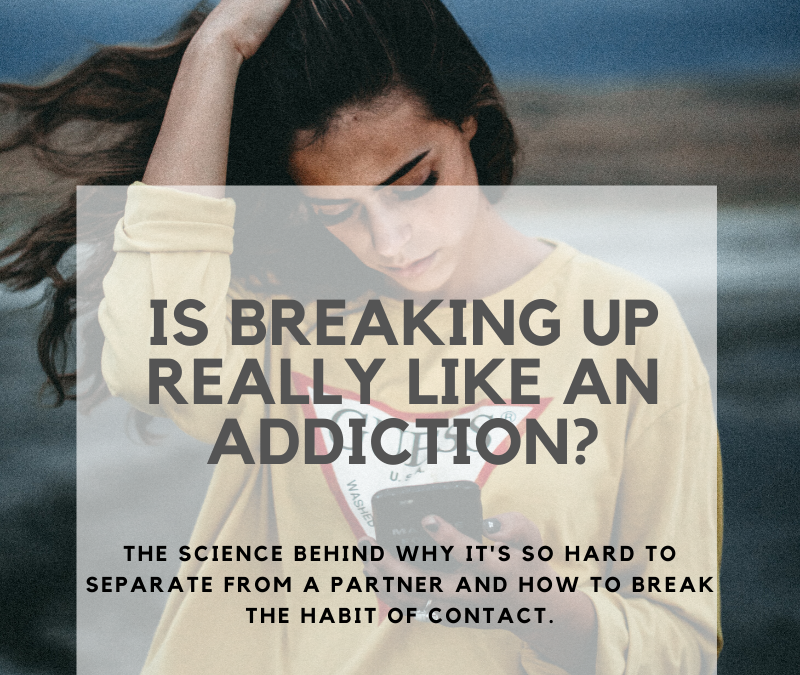A no-contact period is one of my top suggestions for anyone going through a break-up. I have several reasons for this, some discussed on my blog post “Why Going No-contact With Your Ex is Essential for Your Break-up Success.” One reason is simple. When you are used to having a partner in your life, your mind and body get so used to it that breaking up is like an addiction i.e., the habit of connecting can be that hard to break.
You may have heard this before, but is it true? Let’s take a look at what science has to say about it.
How a break-up is like an addiction: the science
Many studies have been done that look at the impact that separating from a romantic partner has on the brain. Here are three that provide the basics:
- A Columbia University study looked at unmarried single people who had separated from a romantic partner in the last six months. When shown photographs of the ex, photographs of a friend, and exposed to a hot probe on their arm, an MRI was conducted. Guess where the similarities in the brain reaction were? Yup, the same part of the brain was activated during the painful arm probe and being exposed to the photograph of the ex. If this part of the brain is activated when you scroll through your Facebook feed and see photos of your ex, no wonder you may be tempted to ease the pain with some contact.
- Neuropsychologist Rhonda Freeman is fascinated with the way our brain responds to relationships. She has studied how the various brain systems react during a break-up. Most significant to the concept of breaking up being like addiction is the reward system of the brain, the one that makes you miss your partner and yup, the same one associated with addiction. When you break-up and don’t have this person around, the reward system will switch on, making you crave contact. This craving can be strong, even if intellectually you know that text is a bad idea.
Any contact at all may ease the signals that the reward system of the brain is pestering you with. This is why so many people have ongoing fights via text or say that they feel that they acted crazy after a break-up and they don’t understand why in retrospect.
- One reason we become bonded to a person that we are attracted to is that attraction and love activate a range of feel-good chemicals and hormones in the body. This is why early love feels SO juicy. According to Neuroethicist, Nicole Vincent, the feel-good chemicals include high doses of oxytocin and vasopressin. These build up over time and are craved by the body when a break-up occurs. AKA – the exact same result as stopping a drug, medication, cigarettes, your iPhone, or other addictions.
It makes sense (AKA – my take)
Science aside, the comparison of breaking up being like an addiction just makes sense. If you have been used to having something in your life, whether it be coffee, crack, a certain salad every day, or a partner, your body gets used to the routine. And when your body gets used to something, it creates a strong body/mind memory that can be really hard to break.
Think of anything that you are used to doing every day. It could be yes, your morning coffee. But it could also be Netflix before bed, checking Facebook, meditating, or even leaving the house. Try to completely remove this thing from your life and see how the first week feels.
If breaking up is like an addiction, what’s the cure?
Self-care
As with many types of anxiety, when it comes to breaking an addiction to a person, listening to what you need to relax or feel better (other than texting your ex!) will do wonders. A break-up is like an addiction because not having contact causes stress and tension in the body. Think of a stressful time from your past. What helped you cope? It may be more sleep, ordering UberEats so that you don’t have to cook, or deleting your social media apps from your phone for a week or two. When you feel the urge to send that text, take a minute or two to think about something that will ease the tension and do it!
Distraction
You’ve got to get your mind on something else, and sitting at home bored and lonely isn’t it. It’s time for long walks, Netflix binges, dinner parties, and yoga classes. When is it the most difficult for you to resist the urge to text or social media stalk? Make a plan, call in some reinforcements, and execute!
Determination
I like to tell my break-up coaching clients that the easiest way to make a decision about getting in touch with an ex is to think about your dignity combined with how you want to feel when looking back on your actions later on.
The next time you get tempted to respond to a text, send a text, or take a quick look at that Facebook account, try this exercise:
- Sit quietly for a moment. Turn off anything that you are listening to. Close your eyes if you’d like.
- Considering what you are being tempted to do (texting, checking their social media account), think of yourself two weeks from now. Picture yourself knowing that you had avoided the contact and how strong and kick-ass you feel. Picture yourself telling someone how strong you’ve been. Consider for just a moment the alternative and how you may feel if you give in to the urges. Which feels better?
- Picture yourself one month from now after the pain of the break-up has gone away and imagine yourself completely free of the need to have contact with your ex. Imagine how liberated and light you feel.
- PUT YOUR PHONE AWAY or turn on a good podcast and head out for a walk.
Take away the source of the pain
Our phones have made it really easy to get in touch with people, hasn’t it? I’m totally pro-cellphone, but during a break-up, they sometimes do more harm than good! If a break-up is like an addiction, your phone is the dealer and they are WAY too available to give you your fix!
PLEASE delete your ex’s number from your phone. If you need more time, at the very least, change their name in your phone. Do SOMETHING to prevent a quick text during a vulnerable moment.
Ways to delete your ex from your phone:
- Block their number from your phone
- Mute their messages
- Mute them on social media accounts if you aren’t ready to block them
- Restrict them from seeing all of your posts on Facebook
- Change their name to “DO NOT ANSWER” in your phone
- Ignore posts on Instagram if you aren’t ready to block them
- BLOCK THEM!
Get support
Do you have a friend who understands what you are going through and wants to help? Are they someone you trust? Have a conversation with this person and let them know what you are going through. Tell them you’d like to have some accountability around not contacting your ex. Work out an agreement with them that feels supportive. Maybe you agree to text this person before your ex. Maybe they hop on a call with you when you are feeling really low.
Maybe just telling them how hard it is will help you to understand that it’s also a bit irrational and that in and of itself will help you go no-contact.
Whatever you decide, remember that it is up to you to own your commitment. It won’t do any good to agree to contact your friend first if you just decide to text your ex late one night anyway.
Sometimes it can be problematic to work with a friend on this sort of thing. That’s where my coaching comes in! Hit me up here to talk about getting some extra support for a couple of weeks.
Yes, recovering from a break-up is like an addiction. And addictions can be broken. The first few weeks are hard, and then each day gets easier and easier. There is a lot of power and possibility on the other side. I believe in you!



Recent Comments